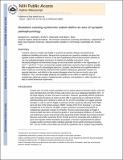Mutations causing syndromic autism define an axis of synaptic pathophysiology
Author(s)
Auerbach, Benjamin David; Osterweil, Emily; Bear, Mark
DownloadBear_Mutations causing.pdf (2.133Mb)
PUBLISHER_POLICY
Publisher Policy
Article is made available in accordance with the publisher's policy and may be subject to US copyright law. Please refer to the publisher's site for terms of use.
Terms of use
Metadata
Show full item recordAbstract
Tuberous sclerosis complex and fragile X syndrome are genetic diseases characterized by intellectual disability and autism. Because both syndromes are caused by mutations in genes that regulate protein synthesis in neurons, it has been hypothesized that excessive protein synthesis is one core pathophysiological mechanism of intellectual disability and autism. Using electrophysiological and biochemical assays of neuronal protein synthesis in the hippocampus of Tsc2+/− and Fmr1−/y mice, here we show that synaptic dysfunction caused by these mutations actually falls at opposite ends of a physiological spectrum. Synaptic, biochemical and cognitive defects in these mutants are corrected by treatments that modulate metabotropic glutamate receptor 5 in opposite directions, and deficits in the mutants disappear when the mice are bred to carry both mutations. Thus, normal synaptic plasticity and cognition occur within an optimal range of metabotropic glutamate-receptor-mediated protein synthesis, and deviations in either direction can lead to shared behavioural impairments.
Date issued
2011-11Department
Massachusetts Institute of Technology. Department of Brain and Cognitive Sciences; Picower Institute for Learning and MemoryJournal
Nature
Publisher
Nature Publishing Group
Citation
Auerbach, Benjamin D., Emily K. Osterweil, and Mark F. Bear. “Mutations Causing Syndromic Autism Define an Axis of Synaptic Pathophysiology.” Nature 480, no. 7375 (November 23, 2011): 63–68.
Version: Author's final manuscript
ISSN
0028-0836
1476-4687